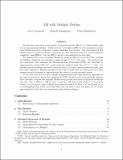| dc.contributor.author | Aaronson, Scott | |
| dc.contributor.author | Impagliazzo, Russell | |
| dc.contributor.author | Moshkovitz Aaronson, Dana Hadar | |
| dc.date.accessioned | 2014-11-14T16:06:56Z | |
| dc.date.available | 2014-11-14T16:06:56Z | |
| dc.date.issued | 2014-06 | |
| dc.identifier.isbn | 978-1-4799-3626-7 | |
| dc.identifier.uri | http://hdl.handle.net/1721.1/91565 | |
| dc.description.abstract | We introduce and study a new model of interactive proofs: AM(k), or Arthur-Merlin with k non-communicating Merlins. Unlike with the better-known MIP, here the assumption is that each Merlin receives an independent random challenge from Arthur. One motivation for this model (which we explore in detail) comes from the close analogies between it and the quantum complexity class QMA(k), but the AM(k) model is also natural in its own right. We illustrate the power of multiple Merlins by giving an AM(2) protocol for 3SAT, in which the Merlins' challenges and responses consist of only n[superscript 1/2+o(1)] bits each. Our protocol has the consequence that, assuming the Exponential Time Hypothesis (ETH), any algorithm for approximating a dense CSP with a polynomial-size alphabet must take n[superscript (log n)1-o(1)] time. Algorithms nearly matching this lower bound are known, but their running times had never been previously explained. Brandao and Harrow have also recently used our 3SAT protocol to show quasipolynomial hardness for approximating the values of certain entangled games. In the other direction, we give a simple quasipolynomial-time approximation algorithm for free games, and use it to prove that, assuming the ETH, our 3SAT protocol is essentially optimal. More generally, we show that multiple Merlins never provide more than a polynomial advantage over one: that is, AM(k) = AM for all k=poly(n). The key to this result is a sub sampling theorem for free games, which follows from powerful results by Alon et al. And Barak et al. On sub sampling dense CSPs, and which says that the value of any free game can be closely approximated by the value of a logarithmic-sized random subgame. | en_US |
| dc.description.sponsorship | National Science Foundation (U.S.) (Grant 0844626) | en_US |
| dc.description.sponsorship | National Science Foundation (U.S.) (Alan T. Waterman Award) | en_US |
| dc.description.sponsorship | National Science Foundation (U.S.) (Grant 1218547) | en_US |
| dc.language.iso | en_US | |
| dc.publisher | Institute of Electrical and Electronics Engineers (IEEE) | en_US |
| dc.relation.isversionof | http://dx.doi.org/10.1109/CCC.2014.13 | en_US |
| dc.rights | Creative Commons Attribution-Noncommercial-Share Alike | en_US |
| dc.rights.uri | http://creativecommons.org/licenses/by-nc-sa/4.0/ | en_US |
| dc.source | MIT web domain | en_US |
| dc.title | AM with Multiple Merlins | en_US |
| dc.type | Article | en_US |
| dc.identifier.citation | Aaronson, Scott, Russell Impagliazzo, and Dana Moshkovitz. “AM with Multiple Merlins.” 2014 IEEE 29th Conference on Computational Complexity (CCC) (June 2014). | en_US |
| dc.contributor.department | Massachusetts Institute of Technology. Department of Electrical Engineering and Computer Science | en_US |
| dc.contributor.mitauthor | Aaronson, Scott | en_US |
| dc.contributor.mitauthor | Moshkovitz Aaronson, Dana Hadar | en_US |
| dc.relation.journal | Proceedings of the 2014 IEEE 29th Conference on Computational Complexity (CCC) | en_US |
| dc.eprint.version | Author's final manuscript | en_US |
| dc.type.uri | http://purl.org/eprint/type/JournalArticle | en_US |
| eprint.status | http://purl.org/eprint/status/PeerReviewed | en_US |
| dspace.orderedauthors | Aaronson, Scott; Impagliazzo, Russell; Moshkovitz, Dana | en_US |
| dc.identifier.orcid | https://orcid.org/0000-0002-5157-8086 | |
| dc.identifier.orcid | https://orcid.org/0000-0003-1333-4045 | |
| dspace.mitauthor.error | true | |
| mit.license | OPEN_ACCESS_POLICY | en_US |
| mit.metadata.status | Complete | |
